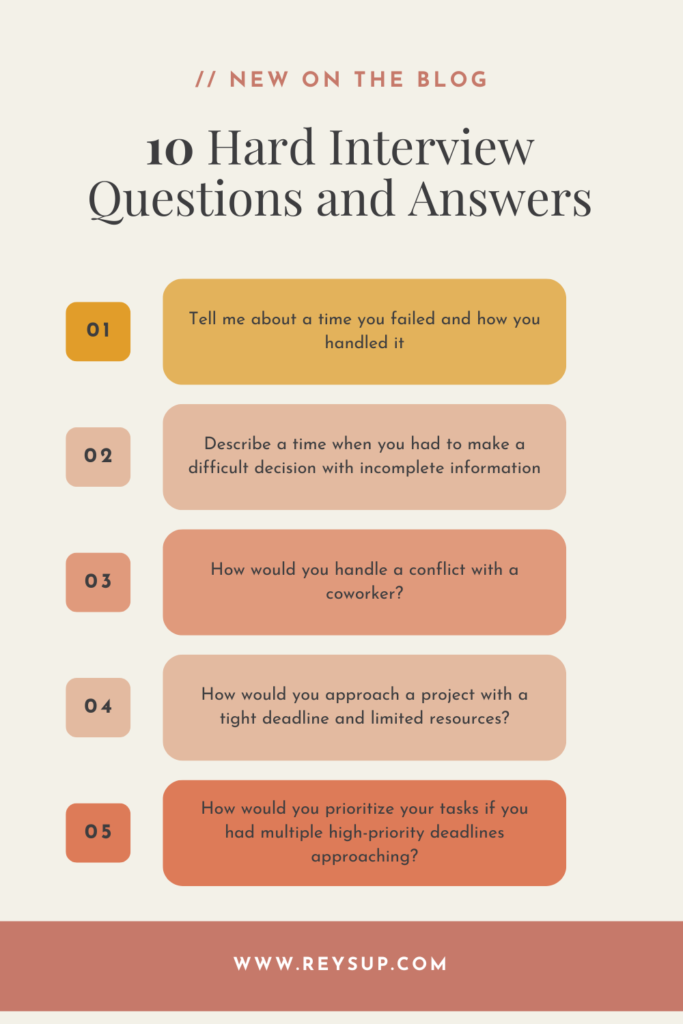In this article we discuss how to navigate hard interview questions. This includes understanding hard interview questions, preparing for the questions, and we provide sample answers.

Interviews are a crucial part of the job process. They provide an opportunity for candidates to showcase the skills they have built, experiences they have had, and assess their overall fit for the job. There are a variety of interview question from “Tell Me About Yourself” all the way to “Solve this Problem”. While some are easy, other are designed to challenge a candidate and really assess their overall fit for a role. Interview questions can be overwhelming, but with adequate preparation and the right strategy, candidates can nail these tough interview questions. This articles dives into hard interview questions, how to prepare for them, and shares strategies for putting together rockstar answers.
Understanding Hard Interview Questions
Interviewers love to ask challenging interview questions to push candidates outside of their comfort zone and see how they handle pressure. Hard interview questions require well thought out and in-depth responses. Interview questions can be categorized into 4 different types of questions:
- Behavioral Questions: Behavioral Interview questions encourage candidates to reflect on their past behavior. This is an opportunity for employer to assess future behavior based on past performance. Behavioral interview questions often being with the words “Tell me about a time when…”
- Situational Questions: Situational questions are focused on how a candidate will approach future situations. They tend to start with “What would you do if…”
- Technical Questions: These questions are all about ensuring a candidate can meet the hard skills required for a job. These questions focus on testing how well a candidate knows the subject matter required to be successful in their role.
- Problem-Solving Questions: These questions are designed to understand how a candidate approached problems and applies critical thinking to important situations.
Intention is everything and understanding the “why” behind these questions gives better insights into how to prepare thoughtful and effective answers. Hard interview questions are asked to understand if a candidate meets the job requirements, fits into company culture, and is able to handle high pressure situations.
Preparing for Hard Interview Questions
Preparation is single handedly the key to success not just in interviews, but in life. However, when it comes to interview, here is how you can prepare responses that WOW your future employer.
- Research the Company and Role: Get to know as much about the company and role as you can. This involves going over the company website, researching across the web, and even reaching out to existing employees. You want to understand the company’s core values and what they are aiming to do. For a list of things to think about go to our article here which dives into questions that could be asked on the company and role.
- Analyze the Job Description: Thoroughly review the qualifications and requirements mentioned in the job posting. Bring out your highlighter to identify keywords. Consider how your past work experiences match these requirements and be ready to discuss them.
- Review Common Hard Interview Questions: Familiarize yourself with the most common tough interview questions. Practice crafting answers that highlight your relevant experiences and skills. Keep reading for our hard interview question examples.
- Conduct Mock Interviews: Practice with a friend, mentor, or professional coach. Simulate the interview environment to build confidence and receive constructive feedback.
Strategies for Answering Hard Interview Questions
Facing hard interview questions can be intimidating, but employing the right strategies can make a significant difference:
- Stay Calm and Composed: Take a moment to gather your thoughts before answering. Composure shows confidence and professionalism.
- Use the STAR Method: Structure your answers using the STAR method (Situation, Task, Action, Result). This approach provides a clear and concise framework for detailing your experiences and achievements. For more information on the STAR method, catch our article.
- Be Honest and Authentic: Authenticity resonates more with interviewers than overly rehearsed responses. If you don’t know the answer to a question, it’s better to admit it and explain how you would find the solution.
- Highlight Problem-Solving Skills: Emphasize your ability to think critically and solve problems. Use specific examples to demonstrate these skills.
- Ask for Clarification: If a question is unclear, don’t hesitate to ask the interviewer to clarify. This shows attentiveness and ensures you provide a relevant answer.

Examples of Hard Interview Questions and How to Answer Them
Let’s explore some common hard interview questions and effective ways to answer them:
Hard Behavioral Interview Questions
- Question: “Tell me about a time you failed and how you handled it.”
Answer: “In my previous role as a project manager, we launched a new software product that initially received negative feedback due to usability issues. I took responsibility for the oversight, organized a meeting with the team to identify the root causes, and we implemented an improved user testing process. As a result, we released an updated version that received positive reviews and increased user adoption by 30%.” - Question: “Describe a time when you had to make a difficult decision with incomplete information.“
Answer: “In my previous role as a marketing manager, we were launching a new product, but our market research was incomplete due to time constraints. I had to decide whether to proceed with the launch or delay it for more information. After consulting with the team and weighing the potential risks and benefits, I decided to move forward. We closely monitored the launch and adapted our strategy based on real-time feedback. Although it was challenging, the launch was successful, and we achieved our sales targets.” - Question: “Tell me about a time when you had to lead a team through a significant change.”
Answer: “During my time as a team leader, our company underwent a major restructuring that required us to adopt a new workflow system. I organized a series of training sessions to ensure everyone understood the new processes and addressed any concerns. I also set up a feedback loop to gather input and make necessary adjustments. By maintaining open communication and providing continuous support, I was able to help the team adapt to the change smoothly, ultimately improving our efficiency and productivity.”
Hard Situational Interview Questions
- Question: “How would you handle a conflict with a coworker?”
Answer: “If faced with a conflict with a coworker, I would first seek to understand their perspective by actively listening and asking questions. I believe open communication is key to resolving misunderstandings. If necessary, I would propose a mediation meeting with our manager to ensure a fair resolution. My goal would be to find common ground and maintain a positive working relationship.” - Question: “How would you prioritize your tasks if you had multiple high-priority deadlines approaching?”
Answer: “When faced with multiple high-priority deadlines, I would first assess the urgency and impact of each task. I would create a detailed schedule, breaking down each task into manageable steps. I would prioritize tasks based on their deadlines and importance, and allocate time slots for focused work. If necessary, I would delegate tasks to team members to ensure timely completion. Regularly reviewing and adjusting my plan would help me stay on track and meet all deadlines efficiently.”
Hard Technical Interview Questions
- Question: “Explain a complex technical concept to someone without a technical background.”
Answer: “Imagine you’re trying to describe how the internet works to someone who knows nothing about technology. I would explain it like this: ‘The internet is like a giant library where you can find information on almost anything. When you use your computer or smartphone to search for something, it’s like asking a librarian to find a book for you. The librarian quickly looks through the library’s catalog and brings you the book you need. In this case, the librarian represents search engines like Google, and the books are websites with the information you’re looking for.'” - Question: “How do you keep your technical skills up to date?”
Answer: “I stay current with my technical skills by regularly attending industry conferences, participating in online courses, and reading relevant blogs and journals. I also engage in hands-on practice through side projects and contribute to open-source projects. Additionally, I am part of a professional network where I exchange knowledge and insights with peers. This continuous learning approach helps me stay informed about the latest developments and trends in my field.”
Problem-Solving Questions
- Question: “How would you approach a project with a tight deadline and limited resources?”
Answer: “To tackle a project with a tight deadline and limited resources, I would start by prioritizing tasks based on their impact and urgency. I would create a detailed project plan with clear milestones and deadlines. Effective communication with the team is crucial, so I would ensure everyone understands their roles and responsibilities. I would also identify potential bottlenecks and develop contingency plans to address them. By staying organized and focused, we can optimize our resources and meet the project deadline.” - Question: “What would you do if you were assigned to a project with unclear objectives?”
Answer: “If assigned to a project with unclear objectives, I would first seek clarification from my manager or stakeholders. I would arrange a meeting to discuss the project’s goals, deliverables, and expectations. If further clarification is needed, I would suggest creating a detailed project plan with milestones and checkpoints to ensure alignment. Clear communication and collaboration are essential to avoid misunderstandings and keep the project on track.” - Question: “How would you prioritize your tasks if you had multiple high-priority deadlines approaching?”
Answer: “When faced with multiple high-priority deadlines, I would first assess the urgency and impact of each task. I would create a detailed schedule, breaking down each task into manageable steps. I would prioritize tasks based on their deadlines and importance, and allocate time slots for focused work. If necessary, I would delegate tasks to team members to ensure timely completion. Regularly reviewing and adjusting my plan would help me stay on track and meet all deadlines efficiently.” - Question: “How would you manage a team member who is not meeting performance expectations?”
Answer: “To manage a team member not meeting performance expectations, I would first have a private conversation to understand the underlying issues. I would provide specific examples of where their performance is lacking and discuss potential reasons. Together, we would set clear, achievable goals and develop an improvement plan with regular check-ins to monitor progress. I would also offer support and resources, such as additional training or mentoring, to help them improve. If performance does not improve despite these efforts, I would follow the company’s performance management process.”
Pitfalls to Avoid When Answering Hard Interview Questions
Even well-prepared candidates can fall into common traps when answering hard interview questions. Here are some pitfalls to avoid:
- Over-Complicating Answers: Keep your responses clear and concise. Avoid jargon or overly complex explanations unless necessary.
- Rambling: Stay on topic and be mindful of time. Long-winded answers can lose the interviewer’s interest and dilute the impact of your response.
- Negative Attitude: Avoid speaking negatively about past employers or colleagues. Focus on what you learned from challenging experiences.
- Lack of Specifics: Provide concrete examples to back up your claims. Vague or general answers are less convincing.
- Overconfidence: While confidence is important, overconfidence can come across as arrogance. Balance confidence with humility.
Post-Interview Reflection and Improvement
The interview process doesn’t end when you leave the room. Reflecting on your performance can provide valuable insights for future interviews:
- Analyze Your Performance: Consider which questions you answered well and which ones posed a challenge. Think about how you can improve your responses.
- Seek Feedback: If possible, ask the interviewer for feedback on your performance. Constructive criticism can help you identify areas for improvement.
- Continuous Learning: Keep refining your interview skills by staying updated on industry trends and practicing regularly. Learning from each experience will enhance your confidence and performance over time.
- Peer Review and Feedback: Join a professional network or group where you can share your interview experiences and receive feedback. These groups often provide valuable insights and tips from others who have faced similar challenges.
- Mentorship: Find a mentor in your field who can offer guidance and advice on improving your interview techniques. Mentors can provide personalized feedback and share their own experiences to help you grow.
Conclusion
Handling hard interview questions effectively is a skill that can be developed with preparation and practice. By understanding the types of questions you might face, preparing thoughtful answers, and employing strategic approaches, you can confidently navigate even the most challenging interviews. Remember to stay calm, be authentic, and highlight your problem-solving abilities. With these tools in hand, you’re well-equipped to turn tough interview questions into opportunities to shine.
Moreover, interviews are not just about showcasing your technical skills and experiences. They are also about demonstrating your soft skills, such as communication, teamwork, and adaptability. Employers are looking for well-rounded candidates who can contribute positively to their teams and company culture.
By leveraging these resources and applying the strategies discussed in this article, you’ll be well-prepared to tackle hard interview questions with confidence and poise. Remember, each interview is an opportunity to learn and improve. Good luck!




